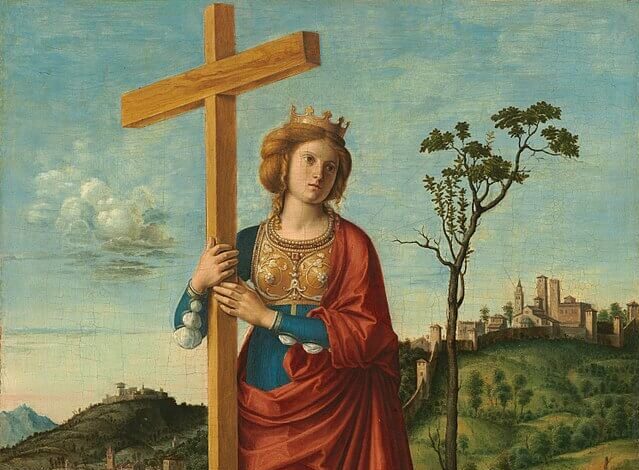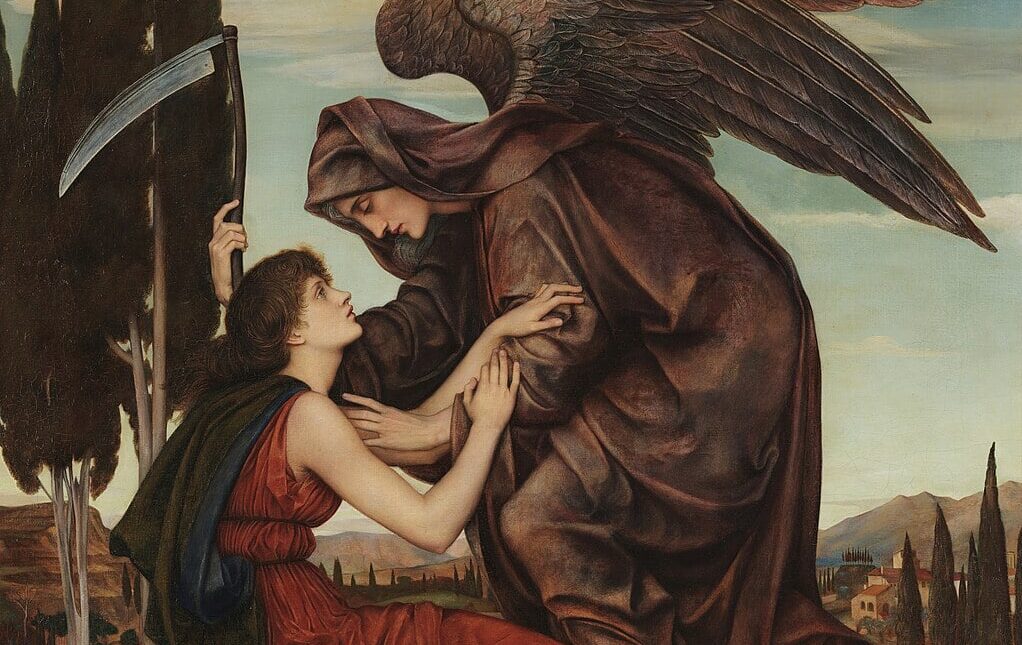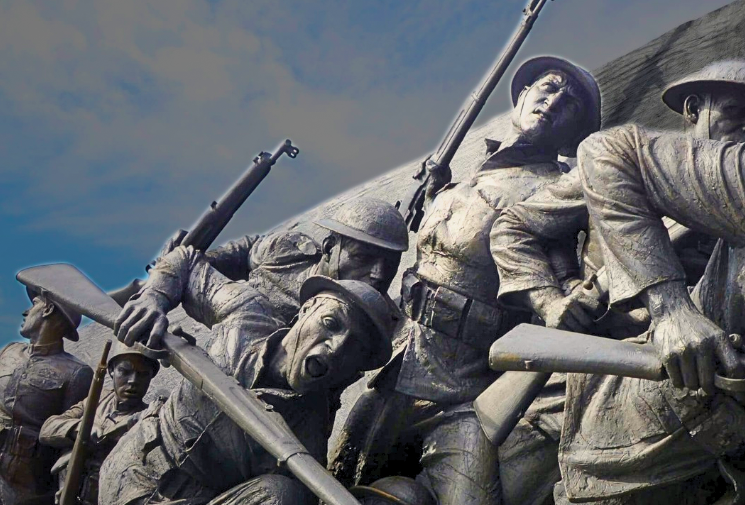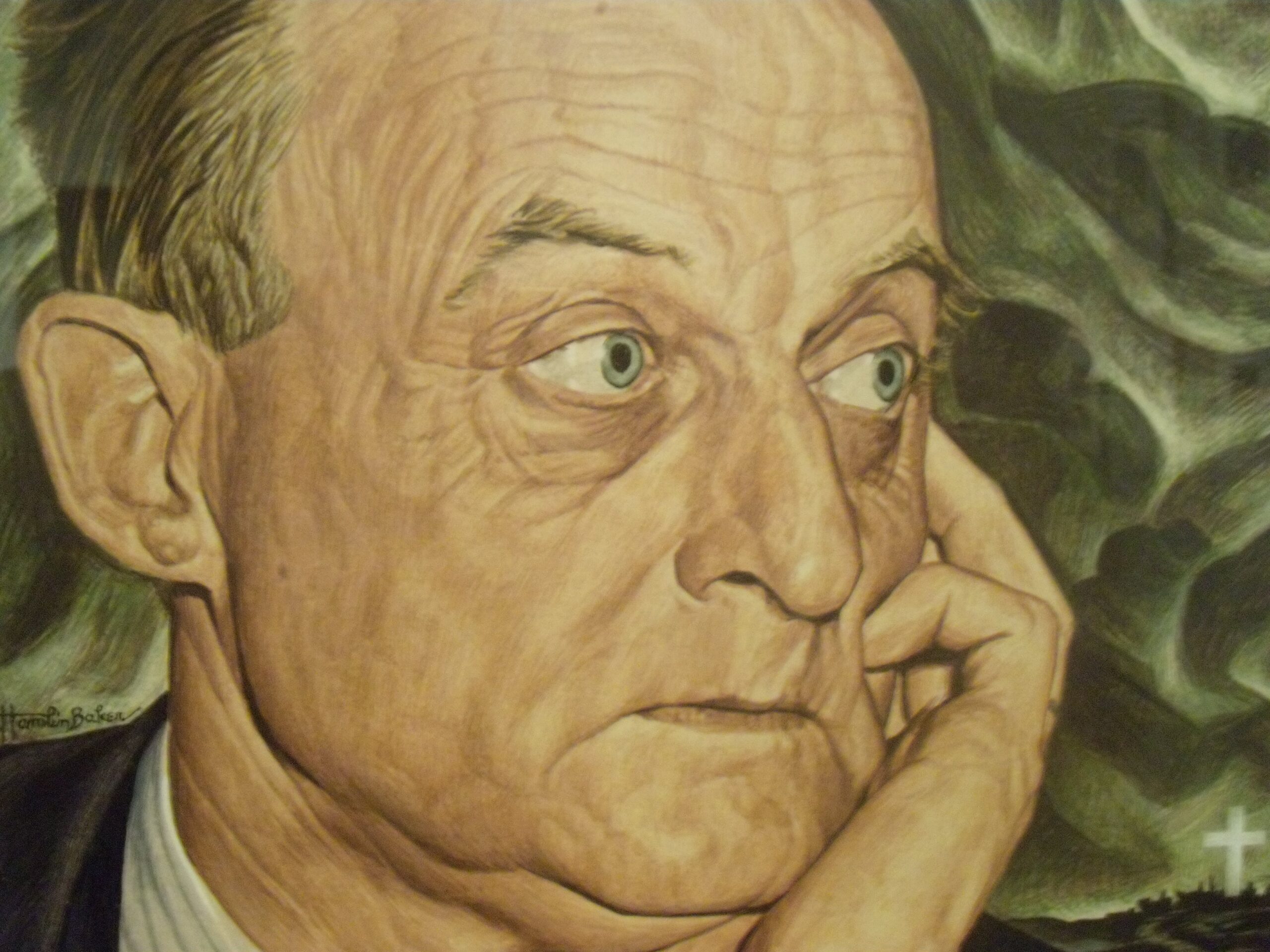Although Evelyn Waugh was a Catholic, Helena (1950), his novel about St. Helen, mother of Constantine the Great, the first Christian emperor, appears at first an anomaly in his career. Waugh wrote a half dozen of the funniest books in English, in a clear, forceful style that is as distinct as that of any twentieth-century British writer. Among modern writers in English only Ernest Hemingway, with whom he had a good deal in common, and William Faulkner created fictional voices as recognizable. In books like Decline and Fall (1928), Black Mischief (1932), A Handful of Dust (1934), Scoop (1938), Put Out More Flags (1942) and his World War II novels, he brings to life dozens of funny characters from the British upper and middle classes who have the element needed for comic success in that type of book: they are believable but absurd, and the absurdity contributes to the believability—there is no seam in the garment that Waugh offers us. Helena is not that kind of book.
Although he is frequently mentioned in relation to P. G. Wodehouse (a writer he greatly admired), their styles have little in common. Wodehouse wrote in a strange, baroque manner that is unique in English prose: “The puzzled frown that had begun to gather on Lord Emsworth’s forehead vanished like breath off a razor blade. Once more Beach, with that lucid brain of his, had dispelled the fog of mystery which had threatened to defy solution.”
Waugh might have admired this passage, but he would never have written its combination of old-fashioned verbal limbs like “fog of mystery” and elusive razor blade image. (Has anyone ever described transient physical concern so easily?) Here is his description of a selfish brother-in-law trying to get the best deal for his sister in her divorce settlement and thereby save himself financial trouble:
He clearly had more to say on the subject and was meditating the most convenient approach. He ate in a ruthless manner, champing his food (it was his habit, often, without noticing it, to consume things that others usually left on their plates, the heads and tails of whiting, whole mouthfuls of chicken bone, peach stones and apple cores, cheese rinds and the fibrous parts of the artichoke.) “Besides, you know,” he said, “it isn’t as though it was all Brenda’s fault.”
In this passage, from A Handful of Dust, we feel Waugh concentrating on the character mercilessly. He wants no distractions from his target. Waugh’s style is classical. He is always interesting, and at his best a great writer.
So Helena, a tale about a fourth-century saint, is completely unlike his other books; but it is also completely unlike other historical novels, a unique work of art, for it is not a romance, unlike almost every other great historical novel, by Scott, Stevenson, Hugo, Tolstoy, Pasternak, or Dickens in A Tale of Two Cities. It does not labor to recreate a period with convincing details of domestic and public life, though its use of such detail is quite plausible; it does not involve the fortunes of a young man or woman, placing their lives in the midst of great historical events, say, the Highland revolt of 1745 or the Napoleonic Wars; it does not invoke a hint of nostalgia—in fact, his World War II novels do that better.
Instead, it takes the key element of Waugh’s art—the fictional narrator’s voice that he created in the 1920s and 1930s, clear, hard, omniscient, judicious, sarcastic—and applies it to something that meant a great deal to him, the history of the Catholic Church in the fourth century, the most crucial period in its development after the Age of the Apostles. For in Helena he tells the story of a saint whose life is easily overshadowed by the lives of other saints and important persons. She lived in a time remarkable for key figures in ecclesiastical history: her son Constantine the Great, Eusebius of Caesarea, Arius, Pelagius, St. Athanasius, St. Ambrose, St. Jerome, St. Monica, St. Augustine, St. Anthony of Egypt, and St. Patrick, among others.
Most of their lives were touched, in one way or another, by the Arian heresy, the most serious in the history of the Church before the Reformation, which developed in the years just after the conversion of Constantine (310 AD). Three important events must be kept in mind: First, in 313, Constantine, the new emperor, and a convert to Christianity, promulgated the Edict of Milan establishing religious toleration in the empire. Second, in 325 he forced the Church to call a council at Nicaea in Turkey to establish regularity in Church teaching, policy, and liturgy. Among other things the Apostles’ (or Nicene) Creed was formulated. Third, the council condemned a new doctrine being preached by an Alexandrian priest named Arius that asserted that the second person of the Trinity, God the Son, was metaphysically secondary to God the Father. The followers of Arius took advantage of ambiguity in the Council’s condemnation and wracked the Church with controversy for the next fifty years.
It was in this period of crisis, illuminated by the lives of great religious figures, when, according to legend, and not much more, the mother of the converted Roman emperor set out to find the very cross upon which Christ had been crucified, Vera Crux, the True Cross. Not only did she set out to find it, but did. Consider this thumbnail sketch of Helena’s quest, set against historical crisis, and we see the difference. Her story is a romance, of the profoundest sort, based on legend but anchored in history. Helena, Constantine’s mother, was canonized a saint; but we know a good deal more about Constantine than we do about her. Eusebius, the great fourth-century historian (and a character in Waugh’s novel) makes no reference to her in his famous History of the Church. Chadwick, a modern historian, in The Early Church, makes one. This is what Waugh had to work with, and he does a masterful job. For he held to the style that had served him throughout his career, the flexible, direct, comic drawing of character we find in his novels.
It is tempting to speculate what Waugh set out to do, since the novel is based on history, however apocryphal; but we have little idea, if any, what his intentions were, as little as we have for most novels by most writers. What we know is what he accomplished, and his great success in Helena is that his Roman Empire is convincing. Of course, he does more than create a plausible setting; but that was his greatest challenge, considering that he usually wrote contemporary comedies. Reading his novels about Fleet Street or the army, we can see that he is always very comfortable (as was Sir Walter Scott) in describing chains of command, whether in the military, publishing, or politics. There is no one like Waugh to describe a knotheaded general, editor, or cabinet member giving orders or advice. He wrote about powerful people, often silly or corrupt, and turned their power and silliness and corruption into something profoundly believable and comic. He created hollow men we understand, movers and shakers often without a thought of their own in their heads who nevertheless control the destiny of others.
His Roman Empire has just this quality, but skillfully toughened. There is the worldly eunuch Marcias stuck in cold, far-off Britain; young Helena moving down the Rhine from fort to fort with her new husband; Eusebius plotting at the court of Constantine; Fausta in her bath about to be murdered after destroying Constantine’s son. We come to believe in Waugh’s imperial network, vast, well-organized, intellectually confused, violent and paranoid. He writes about the Western Empire for most of the book, till Helena’s search takes her to the Holy Land. Waugh is above all convincing when he describes the Empire as a meeting point, where nations, tribes, philosophies, cults, and religions are constantly encountering each other. His barbarian chief, King Coel, has little in common with a slave-intellectual, yet their lives intersect convincingly. Here is the end of the second chapter as Helena is about to leave home.
“What’s going to happen to Marcias?”
A remote and rather kindly look came over the King’s face. “Marcias?” he said. “Marcias. I’ve always been very fond of Marcias. Clever fellow. Wasted as a girl’s tutor.”
“You used sometimes to say, papa, that you’d free him when my education was finished.”
“Did I? Did I say that. I don’t think I ever said anything quite as definite as that. Besides, how was I to know your education would be over so soon? There’s plenty of good work in Marcias yet.”
“I think he wants to go to Alexandria, papa.”
“I’m sure he does. And think how bad it would be for him, I’ve heard all about Alexandria—beastly place; nothing but sophists and aesthetes. I like Marcias. We have obligations towards him. I’d keep him myself but he’s not exactly in my line.”
“Will you give him to me, papa ?”
“My dear child, he’d be completely out of place in a garrison town. He’ll fetch a good price in Gaul; you see if he doesn’t.”
This is the Roman Empire in a nutshell, if such a reduction is possible. Who but Waugh could have compressed the logic of domestic and social power, and the sweep of the Roman world, into a short passage in this way? It is the same compression that Hemingway achieved, used here to show us a world that is remote from us, but comprehensible.
This is especially impressive because the Roman Empire has not been a successful setting for historical novelists, at least not in producing books which could be set alongside Tolstoy and Scott (as opposed to Hollywood, which has staged many a convincing triumph). In the nineteenth century a number of writers attempted it, among them Walter Pater in Marius the Epicurean (1885), Lew Wallace in Ben Hur (1887) and Henryk Sienkiewicz in Quo Vadis (1897), all successful with different audiences but none with the lasting success of Scott, who never attempted anything earlier himself than the Middle Ages, in which his greatest books are set, such as The Fair Maid of Perth (1828), or in the late seventeenth or eighteenth centuries, such as in The Bride of Lammermoor (1819) or Redgauntlet (1824). Robert Grave’s Claudius novels are the best-known in the twentieth century. (Like Hollywood, the stage is another matter. Shakespeare, Dryden, and Shaw, to name only writers in English, had substantial success, although essentially with the same three characters, Caesar, Cleopatra and Anthony.)
Is Helena a religious novel? It certainly is, and a great one.
Part of Waugh’s success is in his time frame. Historical novels need not cover a large span of time—Waverley really only covers a year—but Helena is a life story, taking us from adolescence to old age. A more typical approach might have introduced us to her in middle age, perhaps just after Constantine’s conversion, but before her own, guiding the story toward her decision to search for the cross. Yet Waugh starts at the beginning and for two hundred pages takes us across the Empire in the fourth century, the last of its true greatness, from one end to the other; and does the same with his heroine’s life span, from youth to old age, before we are quite sure what she is all about. The effect is to show us so much of the Empire, make it so strange yet convincing, that her final quest seems the natural, pious outcome of a sensitive spirit’s witnessing so much arbitrary, violent use of power. Yet we have no great battles, triumphs, senatorial debates, we only hear about them. The focus is always close upon the quiet, strong-willed dowager Empress Helena.
If the Empire, Waugh’s landscape, is a success, so are his characters. Besides Coel and Marcias in Britain, we have the mysterious Clorus; the conniving Eusebius and Fausta; an insidious pair of witches; Helena’s desperate, bewildered grandson Crispus; Bishop Macarius in the Holy Land; and Constantine himself, religious, efficient, and crazy, haunted by his desire to establish an imperishable bureaucratic empire, with plotters attempting to manipulate him, and doing so, but often losing terribly in the end.
Is Helena a religious novel? It certainly is, and a great one. It is about the endurance of someone who appears to have everything but really has very little. She has lost her ancestral world in Britain, her second, beloved home in Dalmatia, her husband, her friends, her grandson. Her son is the near-lunatic Emperor of the known world. The religion she has embraced, her one solace, is threatened by the same decadent bureaucracy and aristocracy that have turned the Empire into a fantastic soap opera (with, nevertheless, astonishing stability). So it is largely a story about the virtues of patience and humility, with plots and counterplots as the story line. Faith and fortitude play their share, but Helena is guided by the first two virtues years before she has faith. When that comes, she is transformed into something more than a survivor at the top of the imperial world, and becomes an heroic adventurer on a fabulous quest, still threading her way through Waugh’s empire of courtiers, soldiers, architects, and philosophers, some good, some evil, but all confronted with a woman such as they have never met before.
Where does Helena stand amongst Waugh’s novels? His biographies of Edmund Campion (1935) and Monsignor Ronald Knox (1959) are much like it in some ways. But it is a novel, entertaining, beautifully written, funny, with the development of Helena’s virtue, her sanctification, as the point. I would simply place it with his later books that do not fit into the important Wavian groups: Brideshead Revisited (1945), Scott-King’s Modern Europe (1947), The Loved One (1948), and The Ordeal of Gilbert Pinfold (1957) are all books distinct from the novels of the 1920s and 1930s that have a fashionable London or country-house setting (although many of his books, regardless of setting, conclude in a remote foreign country).
Not that a work of art needs a category to sustain it, but Helena is so unusual among historical novels that we are tempted at least to reconcile it with the author’s other books; which brings us back to my opening point, its uniqueness. It can be housed in whatever mental library we feel comfortable shelving it, but I suppose it is best considered as one of the remarkable group of modern English Catholic books of varied genre that include Chesterton’s Everlasting Man (religious controversy), Ronald Knox’s Enthusiasm (intellectual history), Hilaire Belloc’s Est Perpetua (travel) or Alfred Duggan’s My Life for My Sheep (biography, of St. Thomas Becket). These are just a few works of their kind stretching back to Cardinal Newman and the Oxford movement that mix apologetics with other types of literature.
All of these books are still in print or easily available in academic libraries. Each is inspired by an impulse to fight the Whig version of history which Waugh sets after in his introduction to Helena, when he tells of a well-known English lady, hostile to the Church, who announced to her friends after a visit to Palestine that “the whole story of the crucifixion was made up by a British woman named Ellen.” Waugh had his work cut out for him.
Lawrence Dugan writes criticism for a number of magazines and journals. His poetry has appeared in First Things, Chronicles, and Poetry East.














